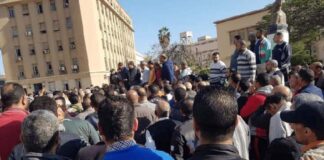RIOTS IN Egypt against a government crackdown have shaken the regime of US-backed dictator Hosni Mubarak.
On April 6, Mubarak’s security forces pre-empted a planned strike by textile workers in Mahalla el-Kubra, one of Egypt’s largest cities. Strike committee leaders Terek Amin and Kamal El-Faioumy were arrested in a pre-dawn raid, as well as another 150 political activists across Egypt.
The arrests triggered days of rioting against the regime. Fifty thousand people gathered in Mahalla’s Tal’at Harb Square, rioting and attacking posters of Mubarak.
Security forces used tear gas and rubber bullets to disperse the crowds. Hundreds of workers as well as women and children were arrested. Tensions remain high within the factories of Mahalla while workers’ leaders remain imprisoned and subject to torture. The regime is deeply unpopular among workers and the urban poor for its corruption. Forty per cent of Egyptians live on less than $US2 at day.
The global food crisis (see page 15) has hit Egyptian people hard. Bread and fuel prices have risen but wages have stagnated. On May 5 the government announced large price rises for car fuel, cigarettes and car licences.
Wildcat strikes
The Mubarak regime has faced a growing wave of workers’ struggle since attempting to privatise the textile industry.
The Mahalla workers, historically the most militant section of the Egyptian working class, mobilised in their tens of thousands in December 2006 to win their pay claim. Their success has led to other textile workers in the coastal city of Alexandria and elsewhere taking industrial action and securing victories.
Militancy in the form of wildcat strike action spread to cement workers and others including railway and auto workers, truck and bus drivers, garbage collectors, public gardeners and poultry workers.
It is too soon to say whether the rise of Egyptian workers’ militancy will be halted by the repression of the Mahalla strikers and the general crackdown on opposition figures.
But with rampant corruption and rising food prices there is growing anger at Mubarak’s regime. Millions of Egyptians are making the connection between the regime’s corruption and its pursuit of the US-backed neo-liberal policies, and underlying issues such as the lack of political freedoms and the suffering of the Palestinians.
Relations between the secular opposition groups and the mass opposition movement the Muslim Brotherhood have improved. The Brotherhood, especially its youth wing, has become more defiant.
Meanwhile the Bush administration looks on nervously. The US has backed Mubarak since he took power in October 1981 following the assassination of then president Anwar Sadat.
Mubarak has ruled under a state of emergency ever since and is a key regional ally of the US. Egyptian secret prisons were used as part of US “rendition” of Guantanamo detainees. Mubarak implements neo-liberal policies and aids the US in avoiding outright confrontation with Israel despite the overwhelming support for the Palestinians amongst ordinary Egyptians.
If the popular movements of Egypt are able to topple Mubarak, it will be a blow to US imperialism in the region and inspire Arabs across the region to confront their own corrupt regimes.
By Wade McDonald





